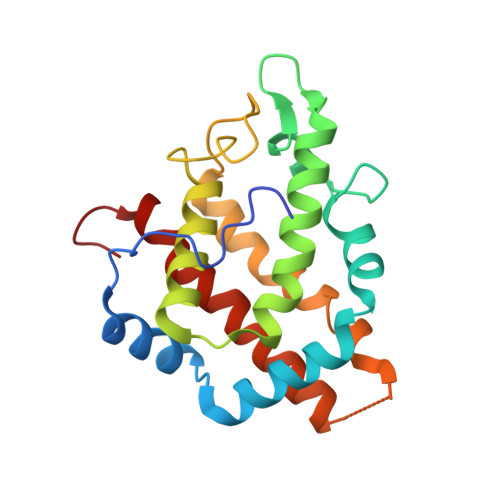MicroED Structure of a Protoglobin Reactive Carbene Intermediate.
Danelius, E., Porter, N.J., Unge, J., Arnold, F.H., Gonen, T.(2023) J Am Chem Soc 145: 7159-7165
- PubMed: 36948184
- DOI: https://doi.org/10.1021/jacs.2c12004
- Primary Citation of Related Structures:
8EUM, 8EUN - PubMed Abstract:
Microcrystal electron diffraction (MicroED) is an emerging technique that has shown great potential for describing new chemical and biological molecular structures. Several important structures of small molecules, natural products, and peptides have been determined using ab initio methods. However, only a couple of novel protein structures have thus far been derived by MicroED. Taking advantage of recent technological advances, including higher acceleration voltage and using a low-noise detector in counting mode, we have determined the first structure of an Aeropyrum pernix protoglobin ( Ape Pgb) variant by MicroED using an AlphaFold2 model for phasing. The structure revealed that mutations introduced during directed evolution enhance carbene transfer activity by reorienting an α helix of Ape Pgb into a dynamic loop, making the catalytic active site more readily accessible. After exposing the tiny crystals to the substrate, we also trapped the reactive iron-carbenoid intermediate involved in this engineered Ape Pgb's new-to-nature activity, a challenging carbene transfer from a diazirine via a putative metallo-carbene. The bound structure discloses how an enlarged active site pocket stabilizes the carbene bound to the heme iron and, presumably, the transition state for the formation of this key intermediate. This work demonstrates that improved MicroED technology and the advancement in protein structure prediction now enable investigation of structures that was previously beyond reach.
- Department of Biological Chemistry, University of California, Los Angeles, 615 Charles E. Young Drive South, Los Angeles, California 90095, United States.
Organizational Affiliation:

















